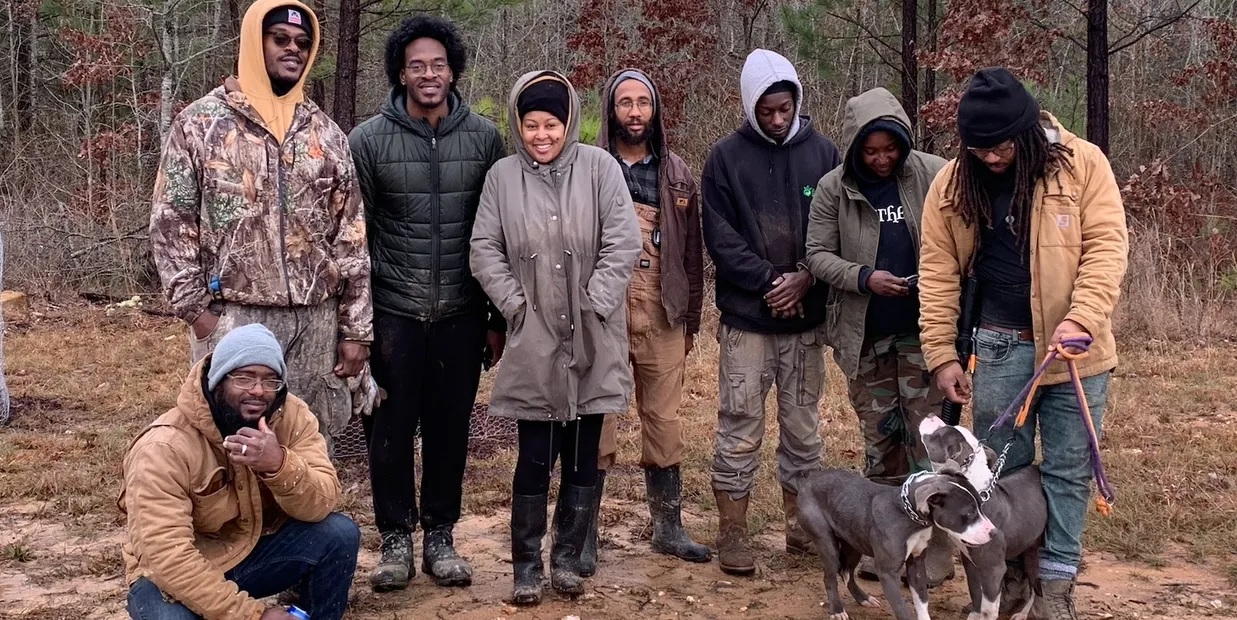
- Farmer name: G4 Farms LLC, owned by Raina Turner-Greenlea, Charles Greenlea III, & George Turner III
- Method of Access: Inherited family land
- Acreage: 160 acres in Crawfordville, GA, and an urban homestead on 0.2 acres
- Location: Crawfordville GA, Atlanta, GA
- Year Founded: 2016
- Affordability Tools: self-funded, federal programs, grants, and donations
- Farm Operation: Fruits and nuts, medicinal herbs, teas, dyes and fiber
The Origin Story
Raina Turner-Greenlea and Charles Greenlea III met as community teachers and students of each other. Raina taught a business accelerator course in which Charles was enrolled, and she later enrolled in a community-based course on sustainable agriculture which Charles taught. Charles was teaching a course in sustainable agriculture sponsored by HABESHA, Inc., a Pan-African organization cultivating leadership in youth and families through practical experiences in cultural education, sustainable agriculture, entrepreneurship, holistic health, and technology.
The two also worked on a garden project together. They sparked a connection leading to love, family, and a shared desire for self-reliance and freedom through farming and reconnection with familial ties to the land, and created G4 Farms.
G4 Farms is a family-owned farm operation with a mission to apply Indigenous practices of regenerative land stewardship and agriculture and to create a model for self-sustainable communities. Spearheaded by Raina; Charles; and Raina’s brother, George Turner III, the family incorporated their homestead in Atlanta, Georgia, along with 160 acres in Crawfordville, Georgia, originally purchased by their grandparents in 1940.
Raina’s grandfather turned their newly acquired land into a functioning farm, with each family member having a role in cultivating crops such as cane, cotton, row crops, and corn. According to Raina, “my grandfather put a big down payment on the land, and within 2 years, he owned all 160 acres outright. He was one of the few Black landowners in Crawfordville.”
Raina’s father was one of 13 children, all of whom worked on the farm. When it was time to decide on the future of the land, everyone agreed it was important to keep it in the family. Eventually, the siblings divided the land and deeded particular parcels to each sibling. All 160 acres are held under a conservation easement. Raina’s father deeded her and her brother his parcel, and they verbally agreed with the remaining family members to maintain the family land in environmentally respectful ways.
“A conservation easement (CE) is a voluntary legal agreement between a landowner and a land trust (or government agency) that permanently restricts certain uses in order to protect the land’s conservation values. Natural forests, wetlands, trails, scenic open space, working farms, timber tracts, and historic sites can all be protected by a CE."
Source: HTTPS://WWW.OCONEERIVERLANDTRUST.ORG/WHAT-IS-A-CONSERVATION-EASEMENT
Funding
Raina and her family are building their farm business with their own funds and some philanthropic support, but without much government funding. “We are not large enough for most federal funding, and for one reason or another, not eligible for other funding as a smaller farm,” explains Raina, as she details their experience being turned down for resources for well-water installation, water diversion, and high tunnels. She was told their plot did not meet many of the criteria for existing funding programs in their area. “We’ve purchased a tractor out of pocket and are considering fencing. No matter, we will keep going and growing. But there should be more opportunities for us as beginning farmers,” explains Raina.
G4 Farms has received funding from the Environmental Quality Incentives Program (EQIP) administered by the USDA’s Natural Resources Conservation Service (NRCS) to incorporate some of the conservation practices suggested by her local NRCS agent. “We hope that more training will become available for local agents to support new and beginning farmers returning to the land, not only starting agricultural businesses but doing so in a way that uplifts ecological, traditional, and sustainable farming practices,” said Raina.
G4 Farms works with other like-minded organizations and supporters who are committed to seeing their farm and mission succeed. Reparation Summer, RAFI, The Come Up Project, and the National Black Food and Justice Alliance have all provided support to G4 Farms in recent years. For their geographic area, a focus on sustainable farming practices can be unusual. Local farmers and contractors have shared that they are surprised by the farm's success in using sustainable practices and avoiding the ‘tried and true’ chemical applications for weeds, invasives, and fertilizers. One city worker laughed as Raina and Charles explained what they wanted to do with their equipment to help install a permaculture design called hugel mounds. When he was done helping he said, “Y’all are the only ones in Crawfordville with one of these!”
The farmers at G4 Farms hope that as a demonstration site, G4 Farms can show that many of the practices they learned through HABESHA and other sustainability programs will prove to be effective methods that can help transition farmers and farms to sustainable and ecologically sound practices.
Continuing the Legacy
G4 Farms operates on a portion of the family’s 160 acres with plans to incorporate more acres into production gradually. The business operates as a limited liability company, the best business structure for them to build credit and grow. The farmers have expanded their business to include their homestead in Atlanta, which serves as a plant nursery and test ground for crops they will plant at the Crawfordville plot.
The goal of G4 Farms is to create an agroecology training center with some manufacturing and processing for bamboo and other native crops currently on their land. To ensure transparency, Raina often consults with her extended family on new ideas and endeavors and has their full support. “I’ll call my aunts and uncles to update them or get advice and I get a ‘Great! Keep going!’ They are happy that the land is being cultivated again and curious to see the progress.” The family is re-establishing roots in Crawfordville and continues to grow their farm business.
This case study was authored by Renee Smith-Nickelson MFALP’18.
